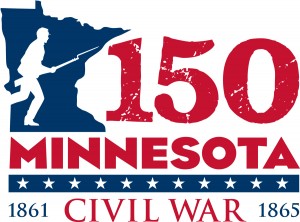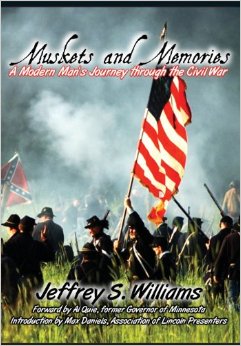Minnesota Civil War Commemoration Task Force
Major Highlights for the week
Wednesday May 21, 1862
Confederate Major General Thomas J. “Stonewall” Jackson’s forces were on the march in Virginia’s Luray Valley heading towards Front Royal, where a brief Federal reconnaissance found very little. On the Chickahominy River, a Federal advance occurred across Bottom’s Bridge in the lowlands east of Richmond.
Thursday May 22, 1862
While Jackson moved towards Front Royal and McClellan’s troops advanced to their positions along the Chickahominy River in Virginia, Federal Major General Henry W. Halleck’s forces skirmished with troops from Confederate General P.G.T. Beauregard at Farmington near Corinth, Miss.
President Abraham Lincoln made a trek to Fredericksburg, Va., to consult with Brigadier General Irvin McDowell.
Friday May 23, 1862
BATTLE OF FRONT ROYAL
Major General Thomas J. “Stonewall” Jackson’s Confederates entered Fort Royal in Virginia’s Shenandoah Valley and easily defeated the 800 Federal troops under Colonel John R. Kenly, capturing many of them. It was not a major battle, but the seizure of Front Royal caused fear in Washington of a major northward move by the Confederate army. This diversion took the attention away from Major General George B. McClellan’s efforts in the Peninsula Campaign near Richmond.
President Abraham Lincoln visited with Brigadier General Irvin McDowell at Aquia Creek and Fredericksburg, Va., before returning to Washington.
Saturday May 24, 1862
Significant skirmishing occurred in Virginia’s Shenandoah Valley at Berryville, Strasburg and Middletown. After months of defeat, withdrawal or stalemate, the tide in the Shenandoah Valley seemed to bring Confederate victories.
President Abraham Lincoln conferred with Secretary of War Edwin Stanton in Washington about a redeployment of forces.
Skirmishing occurred at New Bridge, Seven Pines, Mechanicsville and Hanover Courthouse, Va., as part of McClellan’s Peninsula Campaign. In the Western Theater, skirmishing occurred at Corinth, Miss.; Spring Hill, Mo.; and Winchester, Tenn.
Sunday May 25, 1862
BATTLE OF WINCHESTER, VIRGINIA
Despite his religious scruples, Confederate Major General Thomas J. “Stonewall” Jackson fought on Sunday, attacking Major General Nathaniel Banks’s retreating Federals at Winchester in the Shenandoah Valley. He Federals held of Jackson on the right and Ewell on the left, for a while, but eventually broke and retreated towards Harper’s Ferry, Va. Of the 16,000 Confederates engaged, 68 were killed, 329 wounded and 3 missing for a total loss of 400. The Federal troops numbered 62 killed, 243 wounded and 1714 missing or captured for a total loss of 2,019 of the 8,000 engaged.
Monday May 26, 1862
Skirmishing occurred near Franklin, Va.; Calico Rock, Ark.; Crow’s Station near Licking, Mo.; and at Grand Gulf, Miss. The Confederates extended their Trans-Mississippi Department to include Arkansas, Indian Territory (presently Oklahoma), Missouri, west Louisiana and Texas.
Tuesday May 27, 1862
As Major General Nathaniel Banks’s Federals crossed the Potomac at Williamsport, Thomas J. “Stonewall” Jackson pushed northward again towards Harper’s Ferry, Va., skirmishing at Loudoun Heights. More skirmishing occurred in the Peninsula at Slash Church, White Oak, and Hanover Court House. Near Corinth, Miss., more skirmishing occurred on Bridge Creek, while a skirmish also occurred at Monagan Springs near Osceola, Missouri. In Arkansas, a skirmish was fought at Big Indian Creek in White County.
The siege of Corinth, Mississippi formally commenced on this date and included the following Minnesota regiments: 2nd Minnesota Volunteer Infantry, 4th Minnesota Volunteer Infantry, 5th Minnesota Volunteer Infantry, Brackett’s Battalion of Minnesota Cavalry, 1st Minnesota Light Artillery Battery, and the 2nd Independent Battery of Minnesota Light Artillery making it the largest gathering of engaged Minnesota troops at a single location up to that time during the war.
Where Minnesota Regiments were the week of May 21-27, 1862
1st Minnesota Volunteer Infantry – Continued the advance on the Chickahominy River.
2nd Minnesota Volunteer Infantry – Participated in operations in and around Corinth, Miss.
3rd Minnesota Volunteer Infantry – On garrison duty at Murfreesboro, Tenn.
4th Minnesota Volunteer Infantry – Advanced on and participated in siege of Corinth, Miss.
5th Minnesota Volunteer Infantry – Companies B, C and D remained in Minnesota and Dakota Territory on garrison duty while the remaining participated in the siege of Corinth, Miss.
Brackett’s Battalion of Minnesota Cavalry – Advance on and siege of Corinth, Miss.
1st Minnesota Light Artillery Battery – Advance on and siege of Corinth, Miss.
2nd Independent Battery, Minnesota Light Artillery – Advance on and siege of Corinth, Miss.
1st United States Sharpshooters, Company I – Participated in actions at New Bridge and Hanover Courthouse, Va.
2nd United States Sharpshooters, Company A – Participated in McDowell’s advance on Richmond, Va.



Wow! Your site is so cool. I would like to ask your help in steering me to a website (or other resource) that might give me a specific birthdate for my g-g-g grandfather who served in Minn. Co. D, 5th Reg. Volunteer Inf. from Jan. 1862 through Nov. 1863. Our family wants to put a informational plaque at his gravesite and his actual birthdate would be great to have. We know the year to be 1810.
(So he obviously was an older soldier!) Hope you’ve finished that master’s in history by now at SCSU (my college also!). Thanks much in advance.